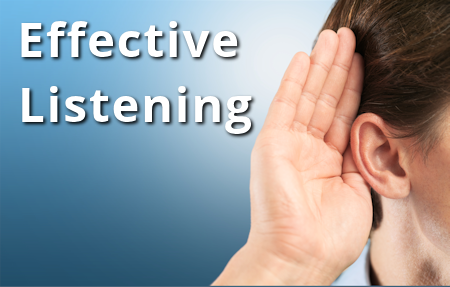 Effective listening is the other half of communication. Our first thought, when we think about communication, may be to consider the speaker’s ability to convey ideas effectively. What we often forget is that without a listener the speaker may as well be talking to the wind. Just as effective speaking is an acquired skill, so is effective listening. Some do it better than others. But all of us can learn to enrich our own listening skills.
Effective listening is the other half of communication. Our first thought, when we think about communication, may be to consider the speaker’s ability to convey ideas effectively. What we often forget is that without a listener the speaker may as well be talking to the wind. Just as effective speaking is an acquired skill, so is effective listening. Some do it better than others. But all of us can learn to enrich our own listening skills.
Learn to Listen Effectively
The first step in mastering effective listening skills is to become aware of why it is important in your life and your relationships. And the next step is simply to start doing it. Practice whenever you can.
Effective listening is more than passively remaining silent while the other person talks. It is the other half of an active collaborative process. The first level is attentive listening. In this mode we take the position that we are genuinely interested in the other person’s point of view. We accept the fact that we have something to learn from the interaction. However, this level of listening has its limitations.
The second, and more powerful, level is active listening (or reflective listening). This assumes that communication is truly a two-way process that involves giving feedback. Active listening requires that the listener paraphrase, clarify, and give feedback.
Good relationships are characterized by good listening skills on the part of both partners. When we listen well to someone we not only show that person respect and care, but we show that we are open to the world around us.
Obstacles to Effective Listening
Take a look at some of the common obstacles to active listening that typically interfere with healthy communication. Learn to recognize them when they are happening. And remember that obstacles can usually be removed.
- Being judgemental
- Rehearsing
- Filtering
- Advising
- Mind reading
- Pleasing
- Deflecting
